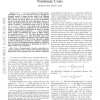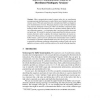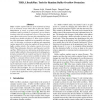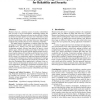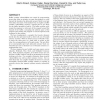ISSRE
2010
IEEE
13 years 2 months ago
2010
IEEE
Buffer overflow is known to be a common memory vulnerability affecting software. It is exploited to gain various kinds of privilege escalation. C and C++ are very commonly used to ...
ICISS
2010
Springer
13 years 2 months ago
2010
Springer
Abstract. Code injection attacks that target the control-data of an application have been prevalent amongst exploit writers for over 20 years. Today however, these attacks are gett...
TIT
2008
13 years 4 months ago
2008
Let P = {p(i)} be a measure of strictly positive probabilities on the set of nonnegative integers. Although the countable number of inputs prevents usage of the Huffman algorithm, ...
CONCUR
2010
Springer
13 years 5 months ago
2010
Springer
Many communication-centred systems today rely on asynchronous messaging among distributed peers to make efficient use of parallel execution and resource access. With such asynchron...
USS
2004
13 years 6 months ago
2004
Buffer overflow exploits make use of the treatment of strings in C as character arrays rather than as first-class objects. Manipulation of arrays as pointers and primitive pointer...
CISIS
2008
IEEE
13 years 6 months ago
2008
IEEE
While memory-safe and type-safe languages have been available for many years, the vast majority of software is still implemented in type-unsafe languages such as C/C++. Despite ma...
ASPLOS
2008
ACM
13 years 6 months ago
2008
ACM
Memory errors are a notorious source of security vulnerabilities that can lead to service interruptions, information leakage and unauthorized access. Because such errors are also ...
ACSAC
2004
IEEE
13 years 8 months ago
2004
IEEE
Buffer overflow vulnerabilities are caused by programming errors that allow an attacker to cause the program to write beyond the bounds of an allocated memory block to corrupt oth...
ISW
2004
Springer
13 years 10 months ago
2004
Springer
The ICAT statistics over the past few years have shown at least one out of every five CVE and CVE candidate vulnerabilities have been due to buffer overflows. This constitutes a si...
CF
2004
ACM
13 years 10 months ago
2004
ACM
Although many defense mechanisms against buffer overflow attacks have been proposed, buffer overflow vulnerability in software is still one of the most prevalent vulnerabilities e...

